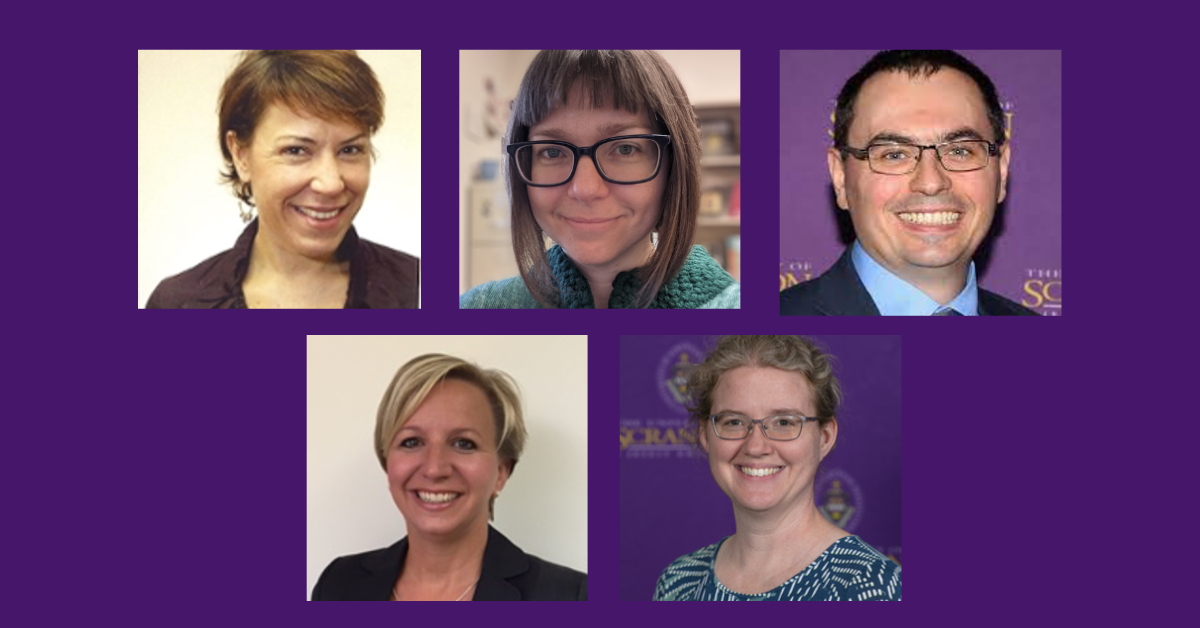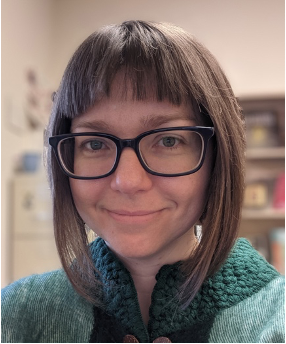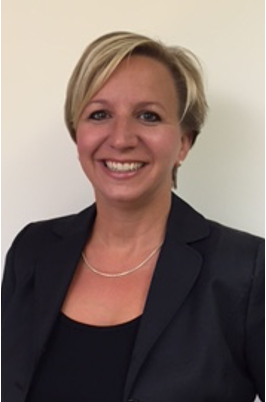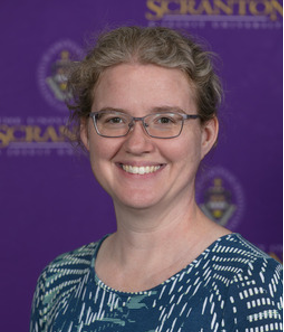Office of Community-Based Learning Announces Faculty Fellows

The Office of Community-Based Learning (CBL) announces the second cohort of its CBL Faculty Fellows Program. The purpose of the program is to recognize, reward and support exemplary faculty who are eager to fully integrate CBL as an intentional pedagogical strategy into their courses and/or curricular-based projects. CBL is an academic experience which involves students working with individuals, groups, or organizations in ways structured to meet community-defined needs. The Faculty Fellows program seeks to expand, strengthen and institutionalize CBL at the University as a demonstration of its commitment to the common good.
The 2022-2023 academic year was the inaugural Faculty Fellows program.
“These inaugural fellows adopted the skills and capacities to successfully partner to develop and implement CBL courses. They realized that their teaching could create a sense of community and hope in themselves, their students and the community in concrete ways which serve community identified needs and not only academic purposes. We are excited to continue faculty development which will fulfill St. Ignatius’ vision to develop the whole person and students who seek to ‘be men and women for and with others,’ said Debra Fetherman, PhD, CBL Faculty Coordinator and Associate Professor and Health Promotion Program Director in the Health and Human Performance Department.
The 2023-2024 academic year CBL faculty fellows are listed below, including their department and what course or project they will focus on.
Hope E. Baylow, Communication Sciences & Disorders and Speech-Language Pathology
 Hope E. Baylow, D.A., Assistant Professor, Founding Program Director, Communication Sciences & Disorders and Speech-Language Pathology, in the Department of Health and Human Performance, will focus on a “Speech-Language Pathology Community Based Learning (CBL) Project.” As a component of the new distance education M.S. degree program in Speech-Language Pathology, all graduate degree students must create and execute a 25-hour community-based learning project in their area of residence. Dr. Baylow will work on developing effective strategies for guiding her students in these CBL activities undertaken in their home communities.
Hope E. Baylow, D.A., Assistant Professor, Founding Program Director, Communication Sciences & Disorders and Speech-Language Pathology, in the Department of Health and Human Performance, will focus on a “Speech-Language Pathology Community Based Learning (CBL) Project.” As a component of the new distance education M.S. degree program in Speech-Language Pathology, all graduate degree students must create and execute a 25-hour community-based learning project in their area of residence. Dr. Baylow will work on developing effective strategies for guiding her students in these CBL activities undertaken in their home communities.
Ovidiu C. Cocieru, Management, Marketing and Entrepreneurship
 Ovidiu C. Cocieru, Ph.D., Assistant Professor of Management, Marketing and Entrepreneurship, will focus on integrating CBL into the course, “MGT 410- Sustainability Management.” This course introduces the concepts of sustainability management and how sustainability management applies to relevant instruments and tools used in essential management domains such as marketing, accounting, supply chain management, strategy, or innovation management. Students will also understand the role played by businesses in creating and solving the climate crisis.
Ovidiu C. Cocieru, Ph.D., Assistant Professor of Management, Marketing and Entrepreneurship, will focus on integrating CBL into the course, “MGT 410- Sustainability Management.” This course introduces the concepts of sustainability management and how sustainability management applies to relevant instruments and tools used in essential management domains such as marketing, accounting, supply chain management, strategy, or innovation management. Students will also understand the role played by businesses in creating and solving the climate crisis.
Madeline Gangnes, English and Theatre

Dr. Madeline B. Gangnes, Assistant Professor in the department of English and Theatre, will integrate CBL into her new course, “Climate Fiction,” a literature course on fiction that concerns our planet’s climate in all its facets, with particular attention to anthropogenic climate disruption.
Guided by the Pope’s call to “care for our common home,” and in support of the university’s goal of becoming a Laudato Si’ institution, this course will engage with fiction as a means to understand and address one of the most pressing crises of our time. Students will apply insights gained through literary texts to real-world climate issues and respond to them through various assignments, including a CBL project in collaboration with community partners pursuing environmental justice or climate action.
Chandra Ann Nealon, Occupational Therapy
 Chandra Ann Nealon, faculty specialist in the Department of Occupational Therapy, will work on integrating CBL into her new course, “OT 230 Anatomy & Mechanics of Human Movement.” University of Scranton OT students will form a partnership with the local older adult population through senior living residencies and/or activity centers, affiliated with United Neighborhood Centers (UNC). Using knowledge developed in the above OT course, students will design and implement projects focusing on the human movement components needed (and the effect of impairments) for leisure activities such as painting as well as activities of daily living such as meal preparation (make and pour mocktails). During this process, OT students will also learn about the needs of the older adult population in the Scranton area including social interaction, meaningful activity involvement and aging in place, particularly as recovery from the COVID 19 pandemic continues and the needs of the ever-growing older adult population increase in conjunction with economic constraints.
Chandra Ann Nealon, faculty specialist in the Department of Occupational Therapy, will work on integrating CBL into her new course, “OT 230 Anatomy & Mechanics of Human Movement.” University of Scranton OT students will form a partnership with the local older adult population through senior living residencies and/or activity centers, affiliated with United Neighborhood Centers (UNC). Using knowledge developed in the above OT course, students will design and implement projects focusing on the human movement components needed (and the effect of impairments) for leisure activities such as painting as well as activities of daily living such as meal preparation (make and pour mocktails). During this process, OT students will also learn about the needs of the older adult population in the Scranton area including social interaction, meaningful activity involvement and aging in place, particularly as recovery from the COVID 19 pandemic continues and the needs of the ever-growing older adult population increase in conjunction with economic constraints.
 Jennifer Schwartz, Faculty Specialist in the Department of Physical Therapy, will focus on the project, Community Wellness, as part of the course “PT 755 Teaching and Learning in Physical Therapy.” This community- based learning assignment is designed to prepare students to teach as physical therapists for different audiences in a variety of settings, as well as shape students to be advocates for health promotion and wellness in the community. Based on available community-based learning opportunities (CBL), students will complete a community needs assessment. Then students will select a wellness topic connected to community needs, design learning materials, and complete a community health presentation.
Jennifer Schwartz, Faculty Specialist in the Department of Physical Therapy, will focus on the project, Community Wellness, as part of the course “PT 755 Teaching and Learning in Physical Therapy.” This community- based learning assignment is designed to prepare students to teach as physical therapists for different audiences in a variety of settings, as well as shape students to be advocates for health promotion and wellness in the community. Based on available community-based learning opportunities (CBL), students will complete a community needs assessment. Then students will select a wellness topic connected to community needs, design learning materials, and complete a community health presentation.
“We are so excited about the work these faculty will do in collaboration with community partners and together with their students as we continue to strengthen community-based learning as a key example of experiential learning and Ignatian pedagogy at the university and one of the ways we live out our mission as an anchor institution in Scranton,” said Julie Schumacher Cohen, Assistant Vice President for Community Engagement and Government Affairs and CBL Board Chair.
For more information on CBL at the University visit www.scranton.edu/cbl






